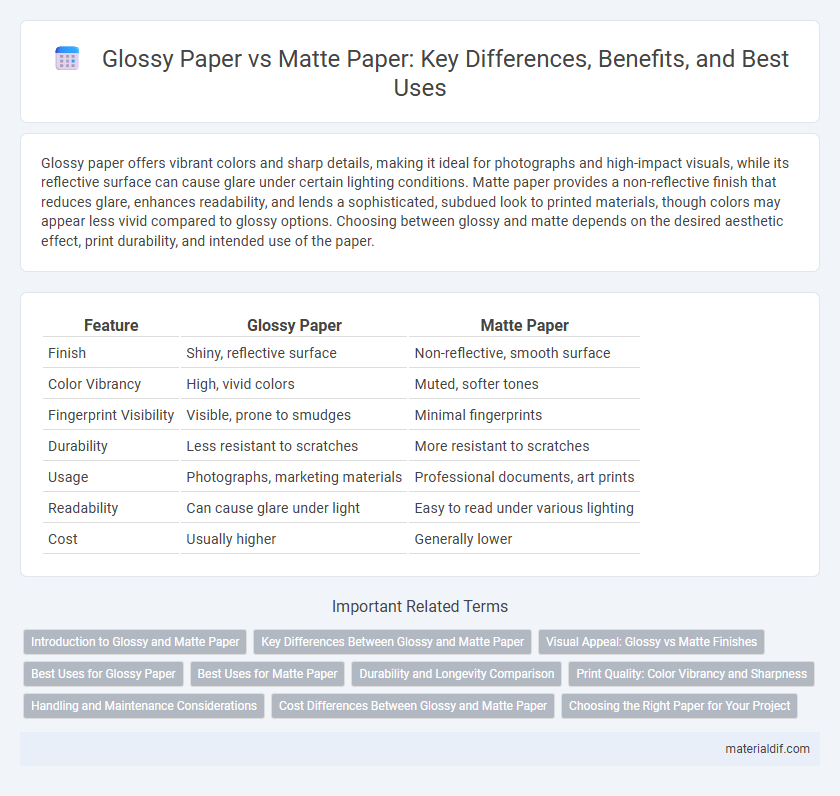Glossy paper offers vibrant colors and sharp details, making it ideal for photographs and high-impact visuals, while its reflective surface can cause glare under certain lighting conditions. Matte paper provides a non-reflective finish that reduces glare, enhances readability, and lends a sophisticated, subdued look to printed materials, though colors may appear less vivid compared to glossy options. Choosing between glossy and matte depends on the desired aesthetic effect, print durability, and intended use of the paper.
Table of Comparison
| Feature | Glossy Paper | Matte Paper |
|---|---|---|
| Finish | Shiny, reflective surface | Non-reflective, smooth surface |
| Color Vibrancy | High, vivid colors | Muted, softer tones |
| Fingerprint Visibility | Visible, prone to smudges | Minimal fingerprints |
| Durability | Less resistant to scratches | More resistant to scratches |
| Usage | Photographs, marketing materials | Professional documents, art prints |
| Readability | Can cause glare under light | Easy to read under various lighting |
| Cost | Usually higher | Generally lower |
Introduction to Glossy and Matte Paper
Glossy paper features a shiny, reflective surface that enhances color vibrancy and sharpness, making it ideal for photo prints and high-impact visuals. Matte paper offers a non-reflective, smooth finish that reduces glare and fingerprints, providing a more subdued and elegant look suited for text-heavy documents and art prints. Both paper types serve distinct purposes based on print quality and aesthetic preferences in professional and creative projects.
Key Differences Between Glossy and Matte Paper
Glossy paper features a shiny, reflective surface that enhances color vibrancy and sharpness, making it ideal for photographs and marketing materials. Matte paper has a non-reflective, smooth finish that reduces glare and fingerprints, providing a more subdued and elegant appearance suited for text-heavy documents and professional presentations. The key differences lie in their finish, print quality, and durability, with glossy paper emphasizing vividness and matte paper prioritizing readability and reduced glare.
Visual Appeal: Glossy vs Matte Finishes
Glossy paper enhances visual appeal through its shiny surface, which intensifies color vibrancy and sharpness, making images and text appear more striking and dynamic. Matte paper offers a non-reflective finish that reduces glare and fingerprints, providing a subtle, elegant look ideal for professional documents and artistic prints. Choosing between glossy and matte finishes depends on the desired aesthetic effect and the viewing environment.
Best Uses for Glossy Paper
Glossy paper excels in enhancing vibrant colors and sharp details, making it ideal for high-quality photographs, marketing materials, and product brochures. Its reflective surface intensifies contrast and saturation, which is perfect for images that require visual impact and clarity. Best uses for glossy paper include photo prints, flyers, and magazine covers where vivid color reproduction is essential.
Best Uses for Matte Paper
Matte paper excels in printing projects that require minimal glare and easy readability, making it ideal for text-heavy documents, art prints, and photographs with subtle color tones. Its non-reflective surface enhances detail visibility and reduces fingerprint smudges, perfect for professional presentations and portfolios. Matte paper's muted finish also provides a sophisticated, elegant look suited for wedding invitations and high-end marketing materials.
Durability and Longevity Comparison
Glossy paper offers a smooth coated surface that resists moisture and fingerprints, enhancing durability and maintaining vibrant print quality over time. Matte paper, with its non-reflective finish, is less prone to scratches but may absorb oils and other contaminants, potentially affecting longevity. When considering durability, glossy paper is ideal for projects requiring long-lasting, visually striking prints, while matte paper suits uses where reduced glare and subtle textures matter more.
Print Quality: Color Vibrancy and Sharpness
Glossy paper enhances print quality by delivering vibrant colors and sharp details through its reflective coating, which intensifies ink saturation and contrast. Matte paper offers a subdued appearance with less glare, producing softer colors and finer texture, ideal for detailed images without shiny reflections. Choosing between glossy and matte paper depends on the desired emphasis on color vibrancy versus subtle sharpness in print results.
Handling and Maintenance Considerations
Glossy paper tends to show fingerprints, smudges, and scratches more easily, requiring careful handling and frequent cleaning to maintain its shiny appearance. Matte paper resists fingerprints and glare, making it easier to handle and less prone to visible wear over time. Proper storage in a cool, dry environment is essential for both types to prevent warping and ensure longevity.
Cost Differences Between Glossy and Matte Paper
Glossy paper generally costs more than matte paper due to its specialized coating that enhances image vibrancy and durability, making it a popular choice for high-quality photo prints and marketing materials. Matte paper, with its non-reflective finish, is typically less expensive and preferred for professional documents and artistic prints where glare reduction is important. The price difference also reflects variations in production processes, material quality, and intended use, impacting the overall expense for bulk purchasing in printing projects.
Choosing the Right Paper for Your Project
Glossy paper enhances color vibrancy and sharpness, making it ideal for photography prints and marketing materials that require visual impact. Matte paper offers a non-reflective finish, reducing glare and providing a sophisticated, subdued appearance suitable for text-heavy documents and art prints. Selecting the right paper depends on project goals, with glossy paper favored for vivid imagery and matte paper preferred for readability and elegance.
Glossy Paper vs Matte Paper Infographic

 materialdif.com
materialdif.com